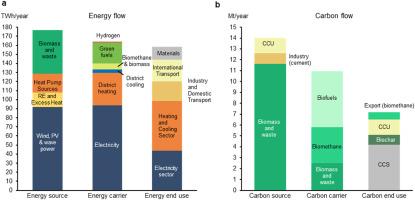Energy balancing and storage in climate-neutral smart energy systems
IF 16.3
1区 工程技术
Q1 ENERGY & FUELS
引用次数: 0
Abstract
This paper takes a smart energy system's approach to the analysis of the need for energy storage and balancing in a future climate-neutral society and thus supports and advances the United Nations' sustainable development goals, in particular SDG 7 (Affordable and clean energy). The study qualifies and quantifies that the best solutions to the transition can only be found by taking a cross-sectoral holistic approach – also known as a smart energy system's approach. Optimal investments in storage and resulting levels of curtailment are identified based on five smart energy system integration levels (SESIL), progressing from a sole electricity sector focus to a fully integrated system of electricity, heating, cooling, industry, transport, and materials. The study finds and quantifies that the overall least-cost solution is only identified in a fully integrated smart energy system, with affordable types of energy storage and little curtailment which cannot be found in a sole electricity sector approach. Furthermore, the study shows and quantifies that with the aim of a climate-neutral society, it becomes essential to take a holistic smart energy system's approach to identify least-cost storage and energy balancing solutions, and suggests a tool and a method to identify such solutions.

气候中和智能能源系统中的能量平衡与储存
本文采用智能能源系统方法分析未来气候中和社会对能源储存和平衡的需求,从而支持并推进联合国可持续发展目标,特别是可持续发展目标 7(负担得起的清洁能源)。研究报告明确并量化了只有采取跨部门的整体方法(也称为智能能源系统方法),才能找到转型的最佳解决方案。根据五个智能能源系统集成级别(SESIL)确定了最佳的储能投资和由此产生的削减水平,从单一的电力部门到电力、供热、制冷、工业、运输和材料的完全集成系统。研究发现并量化了只有在完全集成的智能能源系统中才能找到成本最低的整体解决方案,同时还能找到可负担得起的储能类型和很少的削减,这在单一的电力部门方法中是找不到的。此外,该研究还显示并量化了为实现气候中和社会的目标,必须采用整体智能能源系统方法来确定成本最低的储能和能源平衡解决方案,并提出了确定此类解决方案的工具和方法。
本文章由计算机程序翻译,如有差异,请以英文原文为准。
求助全文
约1分钟内获得全文
求助全文
来源期刊

Renewable and Sustainable Energy Reviews
工程技术-能源与燃料
CiteScore
31.20
自引率
5.70%
发文量
1055
审稿时长
62 days
期刊介绍:
The mission of Renewable and Sustainable Energy Reviews is to disseminate the most compelling and pertinent critical insights in renewable and sustainable energy, fostering collaboration among the research community, private sector, and policy and decision makers. The journal aims to exchange challenges, solutions, innovative concepts, and technologies, contributing to sustainable development, the transition to a low-carbon future, and the attainment of emissions targets outlined by the United Nations Framework Convention on Climate Change.
Renewable and Sustainable Energy Reviews publishes a diverse range of content, including review papers, original research, case studies, and analyses of new technologies, all featuring a substantial review component such as critique, comparison, or analysis. Introducing a distinctive paper type, Expert Insights, the journal presents commissioned mini-reviews authored by field leaders, addressing topics of significant interest. Case studies undergo consideration only if they showcase the work's applicability to other regions or contribute valuable insights to the broader field of renewable and sustainable energy. Notably, a bibliographic or literature review lacking critical analysis is deemed unsuitable for publication.
 求助内容:
求助内容: 应助结果提醒方式:
应助结果提醒方式:


